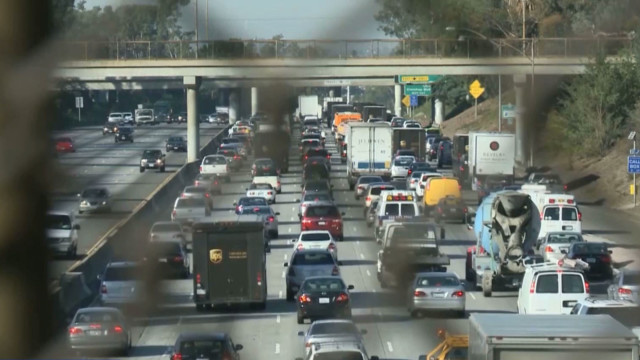The Trump administration has unveiled plans to roll back Obama-era fuel efficiency standards for vehicles.
The move sets up a potential fight with several U.S. states that favor tougher environmental policies.
CGTN’s Roee Ruttenberg reports.
Ten years ago, at the height of the auto industry bailout, the Obama administration negotiated with U.S. carmakers. American auto giants agreed to targets that would dramatically cut emissions. They also agreed to shift more production towards electric and renewable energy-powered vehicles.
Since taking office, U.S. President Donald Trump has repeatedly pledged to put the brakes on that deal. And now, his administration has taken the first step.
“What the (Environmental Protection Agency, or) EPA released yesterday was a notice of proposed rule-making, not a final rule,” White House Press Secretary Sarah Sanders said. “The notice lays out a series of options of how to go forward with CAFE standards. And the notice asks for comments on the range of options. We’re simply opening it up for a comment period. And we’ll make a final decision at the end of that.”
Interested parties now have sixty days to have their say. Critics say: the White House already knows what it wants to do. Indeed, the administration’s proposal would freeze emissions targets at 2020 levels. It would also revoke the authority of states like California to set their own standards.
“California plus 12 other states and D.C. – representing 113 million Americans – have the authority to protect their citizens from dangerous tail-pipe pollutions,” said Madeline Page from the Public Citizen’s Energy and Climate Program. “And this announcement that the Trump administration is going to revoke that right is unprecedented.”
California Governor Jerry Brown called the proposal “stupidity.” Brown said his state would fight back “in every conceivable way possible.”
And Kamala Harris, one of California’s two U.S. senators serving in Washington, tweeted: “This Administration has put a target on California’s back — but we will not let them roll back the progress we’ve made to fight climate change.”
Several states are preparing legal suits, which could delay any changes by years.
The EPA, which oversees emissions, argues the change would make vehicles cheaper and safer. The agency says it is willing to negotiate. But it’s unclear how any changes would gel with the long-term goals of American automakers.
Domestically, pickup trucks and Sports Utility Vehicles – the less energy-efficient kind – generate more profit. But that’s not where the growth is abroad. A shift in production could make U.S. carmakers less globally competitive. Some might shift production of their fuel efficient vehicles to places like China and the EU, where there’s an uptick in demand. Even before this latest announcement, Tesla unveiled plans for a two billion dollar factory in Shanghai. For some, the move was a clear sign that the American carmaker was putting its electric pedal to the metal.
Madeline Page talks implications of Trump’s fuel-efficiency freeze for carmakers
CGTN’s Asieh Namdar spoke to Madeline Page about the clash between federal and state governments over the potential freeze on fuel-efficiency requirements for auto-makers. Page is a Campaign Coordinator for Public Citizen’s Energy and Climate Program. The program advocates clean and affordable energy.
 CGTN America
CGTN America
